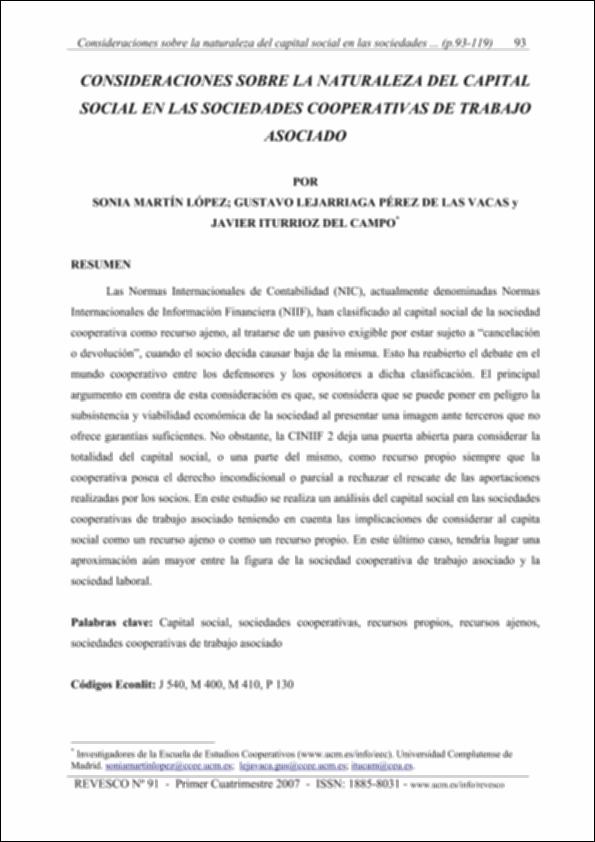Please use this identifier to cite or link to this item:
http://hdl.handle.net/10637/373Consideraciones sobre la naturaleza del capital social en las sociedades cooperativas de trabajo asociado
| Title: | Consideraciones sobre la naturaleza del capital social en las sociedades cooperativas de trabajo asociado Remarks about the nature of shareholders` equity in the associated labour cooperatives Des considérations sur la nature du capital social dans les sociétés coopératives de travail associé |
| Authors : | Martín López, Sonia Lejarriaga Pérez de las Vacas, Gustavo Iturrioz del Campo, Javier |
| Keywords: | Capital social; Sociedades cooperativas; Recursos propios; Shareholder’s equity; Cooperative societies; Associated labour cooperatives |
| Publisher: | AECOOP Escuela de Estudios Cooperativos |
| Citation: | López, S. M., De las Vacas, G. L. P., & Del Campo, J. I. (2007a). Consideraciones sobre la naturaleza del capital social en las sociedades cooperativas de trabajo asociado. Revista de Estudios Cooperativos, v.91, pp.93-119 |
| Abstract: | Las Normas Internacionales de Contabilidad (NIC), actualmente denominadas Normas Internacionales de Información Financiera (NIIF), han clasificado al capital social de la sociedad cooperativa como recurso ajeno, al tratarse de un pasivo exigible por estar sujeto a “cancelación o devolución”, cuando el socio decida causar baja de la misma. Esto ha reabierto el debate en el mundo cooperativo entre los defensores y los opositores a dicha clasificación. El principal argumento en contra de esta consideración es que, se considera que se puede poner en peligro la subsistencia y viabilidad económica de la sociedad al presentar una imagen ante terceros que no ofrece garantías suficientes. No obstante, la CINIIF 2 deja una puerta abierta para considerar la totalidad del capital social, o una parte del mismo, como recurso propio siempre que la cooperativa posea el derecho incondicional o parcial a rechazar el rescate de las aportaciones realizadas por los socios. En este estudio se realiza un análisis del capital social en las sociedades cooperativas de trabajo asociado teniendo en cuenta las implicaciones de considerar al capital social como un recurso ajeno o como un recurso propio. En este último caso, tendría lugar una aproximación aún mayor entre la figura de la sociedad cooperativa de trabajo asociado y la sociedad laboral. The International Accounting Standards (IAS), nowadays International Financial Reporting Standards (IFRS), have classified the shareholders’ equity of the cooperatives as a liability, for being subject to " cancellation or return ", when the partner decides to resign from the cooperative. This has reopened the debate in the cooperative world among the defenders and the opponents for the above mentioned consideration. The principal argument in opposition to this consideration is that it is possible to put in danger the subsistence and economic viability of the society, because its image does not offer enough guarantees. Nevertheless the CINIIF 2 explains that all of the shareholders’ equity, or a part, could be consider as an own resource providing that the cooperative should possess the unconditional or partial right to reject the rescue of the contributions realized by the partners. In this study, an analysis of the shareholders’ equity is realized in the associated labour cooperatives taking into account the implications of the different classifications. If the shareholders’ equity is an own resource then, a still major approximation would take place between the figure of the associated labour cooperative and the employeeowned company. |
| URI: | http://hdl.handle.net/10637/373 |
| Rights : | http://creativecommons.org/licenses/by-nc-nd/4.0/deed.es |
| ISSN: | 1885-8031 |
| Issue Date: | 19-Sep-2007 |
| Center : | Universidad San Pablo-CEU |
| Appears in Collections: | Facultad de Económicas y CC Empresariales |
Items in DSpace are protected by copyright, with all rights reserved, unless otherwise indicated.


